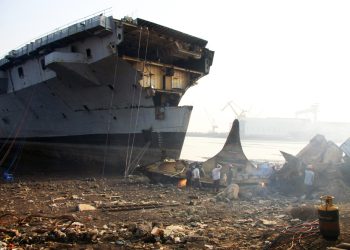Monitoring serves as a powerful tool to ensure that contracts, ethics and compliance processes continue to work and improve. argues Mr. Rohit Agarwal, Managing Partner at GUIDESHIP CONSULTING SERVICES LLP.
With constantly evolving regulatory mandates, industry best practices, and the increasing complexity in today’s environment, the ship owners need the clarity, control and flexibility of a solution to assess compliance post – trade, in order to demonstrate a repeatable and trackable process to the manifold stakeholders.
Guideship Consulting Services’s compliance monitoring solutions will quickly and objectively analyze whether or not a chosen ship recycling yard(s) are meeting specific guidelines, industry requirements, regulations and contract requirements, from the simplest requirement to the most complex quantitative procedures.
The Expectation of Monitoring
Compliance monitoring is a clear expectation but has not been well defined, leaving many companies at a disadvantage in understanding how to effectively incorporate it into their ethics and compliance management efforts.
Expectations which monitoring addresses:
- Internal controls, policies and procedures;
- Effective planning, approval and review;
- Periodic testing of the compliance systems, policies and procedures designed to evaluate their effectiveness
Monitoring and Auditing
Because of the confusion between monitoring and auditing, it is helpful to distinguish between the two.
Monitoring
- Monitoring relates to the activity’s operational structure and close to the activities.
- Monitoring allows for early identification of problems and correction before a problem causes the company to be in non-compliance.
Auditing
- Auditing generally is the checking of activities more independent of the respective daily operation. While auditing may occur far before or after a problem appears there is little option for corrections.
- A distinction between monitoring and auditing is important to ensure that operational management of the ship recycling yard cannot improperly bias or overrule the audit of an activity. In this regard, higher leadership from ship owners’ provides an effective check to ensure that while the audit remains independent, monitoring functions efficiently and effectively fro day to day practices.
The following is an overall approach towards understanding what monitoring is, its value as part of business process and why to integrate it into a ship recycling contract.
Objectives
Monitoring serves numerous goals. At its most basic, it helps to ensure that the ship recycling activity is taking place and actually works so that the expected outcomes are occurring. In this regard, it is an effective tool to identify, review and determine how to handle variations to the expected outcomes that may not have been initially identified.
Monitoring also identifies intentional deviations, such as when a ship recycling yard purposely seeks to stray from a defined process for their own benefit. In doing this, monitoring ensures that ship owners are aware and can take action, before problems occur.
Monitoring helps to improve the ship recycling process’s accuracy, efficiency and effectiveness as it captures possible or actual failures. It also helps in documenting a process’s existence, operation and oversight – and in reporting on the process’s outcomes – so that the ship owning company can demonstrate the process works and is effective. In addition, it supports the ship recycler as he gets an independent and unbiased feedback which can help him to improve further.
Timing
Monitoring can occur prior to, during or after a activity takes place, it may act as a spot check in looking only at randomly selected activities. Ship owners’ may determine to review process expectations with the assumption that they pose the greatest risk, or it may develop a more sophisticated way to evaluate higher-risk activities, such as those that occur in certain demographics, by certain workers or with other select parameters. For example, owners may decide to more closely monitor cleaning and hot works in oily tank, engine room, a complex monitoring program may include a variety of these approaches.
Metrics
Metrics are an important part of any business process and critical to monitoring. The monitor (Guideship) determines whether an activity meets, comes close to or fails to meet its goals. Also, metrics helps to know whether an activity is improving when the metrics improve – or vice versa). Even results that achieve but come close to missing objective provide value, and monitoring of these metrics ensure that ship recycling yard can take appropriate action with this data. Good monitoring supports their continuous improvement as well.
Outcomes
Monitoring helps ship recycling yards to take action when an activity does not meet or is at risk of not meeting the intended results. This step is pivotal in process management. Unaddressed failures or other deficiencies not only weaken a process, they also can create unexpected liabilities if regulators or others determine that the ship recycling company did not take reasonable measures to achieve compliance.
This means that the outcome of monitoring is more than identifying actual or potential non – compliances; it leads to taking corrective actions and minimizes non-compliance risks.
Putting it All Together
Given all of this information, the challenge then is for ship owners to implement monitoring steps that best meet the individual needs. The intent is to develop, implement, maintain and improve monitoring practises so that the ship recycling activity is as efficient and safeas possible.
In short, ensure that monitoring in ship recycling remains as professional and dynamic to the process itself to get the greatest value from it.
As regulations and stakeholders´ expectations become more complex, and evolve faster than ever, you need to keep track and understand the impacts for your business. As part of a comprehensive ship recycling program, your organization must enforce internal policies, comply with external regulatory mandates, assess the risk of doing business with vendors and other third parties as well as ensure transparency and availability of evidence whenever needed.
Our global compliance experts can help you to customize your compliance, performance and simplify it. You’ll benefit from notifications of what happens in the field, progress as well as supplementary reporting.
The views presented hereabove are only those of the author and do not necessarily reflect those of SAFETY4SEA and are for information sharing and discussion purposes only.






























































